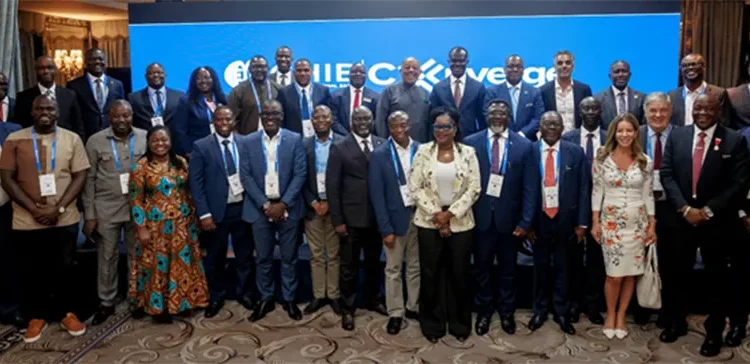Some dignitaries at the conference
The Chief Executive Officer of Ghana International Bank (GHIB), Dean Adansi, has outlined a bold financing strategy aimed at transforming Africa’s commodity trade from raw exports to value-added products, warning that the current model is costing the continent billions in lost revenue.
Speaking to the BBC on the sidelines of the GHIB Converge 2025 conference in London, Mr. Adansi said Africa’s share of global trade remains below three per cent, partly due to a persistent trade finance gap that prevents exporters from investing in local processing.
“Interest rates are significantly higher in many African countries than in the West, making it difficult for smaller firms with short track records to access the funding they need to export or industrialise locally,” he said.
He noted that for every US$1 of trade, there is a US$1.70 impact on GDP, meaning that closing the US$80 billion trade finance gap in sub-Saharan Africa could add around US$133 billion to annual GDP.
According to him, GHIB, which has operated from London for 65 years, is working with local financial institutions in West Africa to strengthen their capacity and attract larger international lenders.
This, Mr Adansi said, will enable local banks to better support small and medium-scale enterprises (SMEs) and exporters.
He indicated that the bank had facilitated more than US$14 billion in trade flows over the past five years, including US$10.6 billion in documentary trade collections and US$2.7 billion in primary trade finance transactions.
In 2024 alone, he said downstream payments to West Africa exceeded US$8.5 billion.
Mr. Adansi stressed that processing plants require significant upfront investment, longer repayment periods, and tailored financing products, needs often unmet by traditional banking.
He stated that GHIB’s proposals include specialised commodity finance tools such as pre-export financing tied to off-take agreements, inventory financing, and equipment leasing.
Research presented at the conference indicated that increasing Africa’s share of value-added exports from 14 to 25 per cent could generate more than US$50 billion in extra annual revenue and millions of jobs.
Ghana’s growth in cocoa processing and gold refining was cited as proof of what targeted finance can achieve.
He also called for improvements in electricity supply, transport networks, skilled labour, and policy reforms to favour processed exports.
The African Continental Free Trade Area (AfCFTA), he argued, offers an opportunity to create regional processing hubs, while digital platforms and blockchain can secure premium prices for certified goods.
Mr. Adansi added that environmental finance could further boost the shift, with sustainably processed commodities earning higher market value.
“The metrics of success go beyond profit,” he said.
“Employment creation, industrial capacity, and technology transfer are the real measures. If we can keep more processing on African soil, the benefits will be felt not just in GDP, but in livelihoods,” he noted.
A Daily Guide Report


